The Founders' Unchanging Principles of Liberty
Archive for the ‘Founding’ Category
The Founders’ Unchanging Principles of Liberty
by Earl Taylor, Jr.
As we celebrate the Declaration of Independence in July and the Constitution in
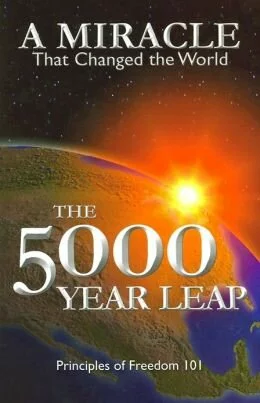
A Miracle that Changed the World
September, let us once again reflect on the marvelous principles underlying these two documents. The following is a review of these principles together with a comment or a quote by the Founders. Documentation may be found in The Five Thousand Year Leap.
Principle 1 – The only reliable basis for sound government and just human relations is Natural Law.
Natural law is God’s law. There are certain laws which govern the entire universe, and just as Thomas Jefferson said in the Declaration of Independence, there are laws which govern in the affairs of men which are “the laws of nature and of nature’s God.”
Principle 2 – A free people cannot survive under a republican constitution unless they remain virtuous and morally strong.
“Only a virtuous people are capable of freedom. As nations become corrupt and vicious, they have more need of masters.” – Benjamin Franklin
Principle 3 – The most promising method of securing a virtuous people is to elect virtuous leaders.
“Neither the wisest constitution nor the wisest laws will secure the liberty and happiness of a people whose manners are universally corrupt. He therefore is the truest friend to the liberty of his country who tries most to promote its virtue, and who … will not suffer a man to be chosen into any office of power and trust who is not a wise and virtuous man.” – Samuel Adams
Principle 4 – Without religion the government of a free people cannot be maintained.
“Of all the dispositions and habits which lead to political prosperity, religion and morality are indispensable supports…. And let us with caution indulge the supposition that morality can be maintained without religion.” – George Washington
Principle 5 – All things were created by God, therefore upon him all mankind are equally dependent, and to him they are equally responsible .
The American Founding Fathers considered the existence of the Creator as the most fundamental premise underlying all self-evident truth. They felt a person who boasted he or she was an atheist had just simply failed to apply his or her divine capacity for reason and observation.
Principle 6 – All mankind were created equal.
The Founders knew that in these three ways, all mankind are theoretically treated as:
1. Equal before God.
2. Equal before the law.
3. Equal in their rights.1.The Freedom to try.
2. The Freedom to buy.
3. The Freedom to sell.
4. The Freedom to fail.
Principle 7 – The proper role of government is to protect equal rights, not provide equal things.
The Founders recognized that the people cannot delegate to their government any power except that which they have the lawful right to exercise themselves.
Principle 8 – Mankind are endowed by God with certain unalienable rights.
“Those rights, then, which God and nature have established, and are therefore called natural rights, such as are life and liberty, need not the aid of human laws to be more effectually invested in every man than they are; neither do they receive any additional strength when declared by the municipal [or state] laws to be inviolable. On the contrary, no human legislation has power to abridge or destroy them, unless the owner [of the right] shall himself commit some act that amounts to a forfeiture.” – William Blackstone
Principle 9 – To protect human rights, God has revealed a code of divine law.
“The doctrines thus delivered we call the revealed or divine law, and they are to be found only in the Holy Scriptures. These precepts, when revealed, are found by comparison to be really a part of the original law of nature, as they tend in all their consequences to man’s felicity.” – William Blackstone
Principle 10 – The God-given right to govern is vested in the sovereign authority of the whole people.
“The fabric of American empire ought to rest on the solid basis of the consent of the people. The streams of national power ought to flow immediately from that pure, original fountain of all legislative authority.” – Alexander Hamilton
Principle 11 – The majority of the people may alter or abolish a government which has become tyrannical.
“Prudence, indeed, will dictate that governments long established should not be changed for light and transient causes … but when a long train of abuses and usurpations … evinces a design to reduce them under absolute despotism, it is their right, it is their duty, to throw off such government, and to provide new guards for their future security.” – Thomas Jefferson in the Declaration of Independence
Principle 12 – The United States of America shall be a republic.
“I pledge allegiance to the flag of the United States of America And to the republic for which it stands….”
Principle 13 – A Constitution should protect the people from the frailties of their rulers.
“If angels were to govern men, neither external nor internal controls on government would be necessary…. [But lacking these] you must first enable the government to control the governed; and in the next place oblige it to control itself.” – James Madison
Principle 14 – Life and liberty are secure only so long as the rights of property are secure .
John Locke reasoned that God gave the earth and everything in it to the whole human family as a gift. Therefore the land, the sea, the acorns in the forest, the deer feeding in the meadow belong to everyone “in common.” However, the moment someone takes the trouble to change something from its original state of nature, that person has added his ingenuity or labor to make that change. Herein lies the secret to the origin of “property rights.”
Principle 15 – The highest level of prosperity occurs when there is a free-market economy and a minimum of government regulations.
Prosperity depends upon a climate of wholesome stimulation with four basic freedoms in operation:
Principle 16 – The government should be separated into three branches .
“I call you to witness that I was the first member of the Congress who ventured to come out in public, as I did in January 1776, in my Thoughts on Government … in favor of a government with three branches and an independent judiciary. This pamphlet, you know, was very unpopular. No man appeared in public to support it but yourself.” – John Adams
Principle 17 – A system of checks and balances should be adopted to prevent the abuse of power by the different branches of government.
“It will not be denied that power is of an encroaching nature and that it ought to be effectually restrained from passing the limits assigned to it.” – James Madison
Principle 18 – The unalienable rights of the people are most likely to be preserved if the principles of government are set forth in a written Constitution.
The structure of the American system is set forth in the Constitution of the United States and the only weaknesses which have appeared are those which were allowed to creep in despite the Constitution.
Principle 19 – Only limited and carefully defined powers should be delegated to government, all others being retained by the people.
The Tenth Amendment is the most widely violated provision of the bill of rights. If it had been respected and enforced America would be an amazingly different country than it is today. This amendment provides:
“The powers not delegated to the United States by the Constitution, nor prohibited by it to the States, are reserved to the States respectively, or to the people.”
Principle 20 – Efficiency and dispatch require that the government operate according to the will of the majority, but constitutional provisions must be made to protect the rights of the minority.
“Every man, by consenting with others to make one body politic under one government, puts himself under an obligation to every one of that society to submit to the determination of the majority, and to be concluded [bound] by it.” – John Locke
Principle 21 – Strong local self-government is the keystone to preserving human freedom.
“The way to have good and safe government is not to trust it all to one, but to divide it among the many, distributing to every one exactly the functions he is competent [to perform best]. – Thomas Jefferson
Principle 22 – A free people should be governed by law and not by the whims of men.
“The end of law is not to abolish or restrain, but to preserve and enlarge freedom. For in all the states of created beings, capable of laws, where there is no law there is no freedom. For liberty is to be free from restraint and violence of others, which cannot be where there is no law.” – John Locke
Principle 23 – A free society cannot survive as a republic without a broad program of general education.
“They made an early provision by law that every town consisting of so many families should be always furnished with a grammar school. They made it a crime for such a town to be destitute of a grammar schoolmaster for a few months, and subjected it to a heavy penalty. So that the education of all ranks of people was made the care and expense of the public, in a manner that I believe has been unknown to any other people, ancient or modern. The consequences of these establishments we see and feel every day [written in 1765]. A native of America who cannot read and write is as rare … as a comet or an earthquake.” John Adams
Principle 24 – A free people will not survive unless they stay strong.
“To be prepared for war is one of the most effectual means of preserving peace.” – George Washington
Principle 25 – “Peace, commerce, and honest friendship with all nations — entangling alliances with none.”- Thomas Jefferson, given in his first inaugural address.
Principle 26 – The core unit which determines the strength of any society is the family; therefore the government should foster and protect its integrity.
“There is certainly no country in the world where the tie of marriage is more respected than in America, or where conjugal happiness is more highly or worthily appreciated.” Alexis de Tocqueville
Principle 27 – The burden of debt is as destructive to human freedom as subjugation by conquest.
“We are bound to defray expenses [of the war] within our own time, and are unauthorized to burden posterity with them…. We shall all consider ourselves morally bound to pay them ourselves and consequently within the life [expectancy] of the majority.” – Thomas Jefferson
Principle 28 – The United States has a manifest destiny to eventually become a glorious example of God’s law under a restored Constitution that will inspire the entire human race.
The Founders sensed from the very beginning that they were on a divine mission. Their great disappointment was that it didn’t all come to pass in their day, but they knew that someday it would. John Adams wrote:
“I always consider the settlement of America with reverence and wonder, as the opening of a grand scene and design in Providence for the illumination of the ignorant, and the emancipation of the slavish part of mankind all over the earth.”
I once again commend these to you. Freedom-loving citizens, young and older, find that memorizing these principles proves to be a valuable asset in their defense of our liberty.
Sincerely,
Earl Taylor, Jr.
Original Article can be found here: http://www.nccs.net/2004-07-the-founders-unchanging-principles-of-liberty.php
Evidence for America’s Christian Heritage
By Bob Dutko
In the debate over the so-called “separation of Church and State” versus America as a Christian nation, we have to look at our Founding Fathers and the facts of history to see the truth about America’s Christian heritage. While it is certainly true that our Founding Fathers did not intend for America to be established as a Christian nation in the same way Iran, for example, is established as a Muslim nation, they did intend for America to promote, endorse and encourage Christianity. The very people who wrote, signed and ratified the Constitution also used the Federal government, it’s land and resources to promote Christianity. Of course, many people today attempt to deny these facts and will sometimes use deception or Straw Man arguments instead of looking at the actual evidence.
The 1st Amendment of the Constitution deals with religion this way: It reads “Congress shall make no law respecting an establishment of religion, or prohibiting the free exercise thereof,…”. So what does that mean? Conservative judges (and I would argue, common sense) would say that means Congress is not allowed to pass a law that would establish an official State religion and also that they can not prohibit people from freely expressing their faith. Liberal judges however, have interpreted the 1st Amendment to mean that no government employees, dollars or land can be used to promote any religious expression at all. So how do we figure out whose interpretation is correct? I’m thinking that the people who would know best what the Founding Father’s intentions were would be…….the Founding Fathers themselves. So let’s go to them.
Fisher Ames is considered by many to be the author of the 1st Amendment. As our Founding Fathers were debating the drafting of the Bill of Rights, he is the Congressman who came up with the language of the 1st Amendment, so logic dictates that if anyone understood what the words meant, it would be him. (Remember that, you’ll see why in a minute). After the Constitution was ratified, some public schools started using more and more books to teach the children, in addition to the Bible. While the Bible was continuing to be taught in the public schools, a trend was developing of introducing more and more secular books into the classroom. One of the Founding Fathers who expressed concern over this trend was…..you guessed it, Fisher Ames who stated: “…we have a dangerous trend beginning to take place in our education….We’ve become accustomed of late to putting little books in the hands of children containing fables with moral lessons. We are spending less time in the classroom on the Bible, which should be the principle text in our schools. The Bible states these great moral lessons better than any other man made book.” In one of my radio debates with the ACLU, I remember saying “Fisher Ames, the author of the 1st Amendment said the Bible should be taught in schools, but you say a teacher even having an open Bible on her desk is a violation of the 1st Amendment, so I’m curious…..who do you think knows more about the 1st Amendment, the guy who WROTE it, or the ACLU, 200 years later? I couldn’t believe my ears when the ACLU actually said to me “we do”. They actually said that.
Most people don’t even know that the term “Separation of Church and State” does not exist anywhere in the Constitution. That term was used by Thomas Jefferson in a personal letter he wrote to the Danbury Baptist Association of Connecticut on January 1, 1802. Liberal judges and lawyers lately have seized on that one phrase he used that one time in that personal letter to create a false perception of what the Constitution actually says. Jefferson wrote that letter to the Danbury Baptists in response to a letter they first wrote him on October 7, 1801, expressing concern that the government might try to infringe on religious freedoms one day. His response letter attempted to assure them that would not happen because there was a “wall of separation between Church and State”. He used those words for the first time to say there was a wall keeping the government from infringing on religious expression. He wasn’t saying the government can’t itself engage in religious expression. Let me prove it.
Remember, Jefferson first used those words in that personal letter on January 1, 1802, while he was President. On December 3, 1803, nearly 2 years AFTER he wrote that letter, President Jefferson, as an official Presidential act, ordered the extension of the 1787 Act of Congress that designated areas of Federal land “for the sole use of Christian Indians and the Moravian Brethren Missionaries for the civilizing of the Indians and promoting Christianity”. That’s right, the actual language that Jefferson ordered to take place was “promoting Christianity” by the Federal Government. He ordered the same governmental promotion of Christianity to the Wyandotte Indians in 1806 and even again in 1807 to the Cherokee Indians. So ask yourself logically, when Thomas Jefferson used those words “separation of Church and State” in that letter, do you really he meant a Nativity Scene can’t sit on government property or a judge can’t hang a picture of the 10 Commandments on his wall? As President, Jefferson ordered 3 times that federal land be used for (in the official language) “promoting Christianity”.
In the many debates I’ve had with groups like the ACLU, Americans United for the Separation of Church and State, American Atheists and others, I’ve noticed a common debate tactic they’ve used time and time again. When confronted with the actual facts of America’s Christian heritage, they find themselves backed into a corner, and then, in an attempt to fight back, they start attacking the personal faith of the Founding Fathers to show how their theology was wrong, how they were hypocrites by owning slaves, etc. While these ad hominem attacks might confuse some debate listeners, they are merely diversionary tactics that have no relevance on the central question…..does the Constitution call for a separation of Church and State, yes or no? The answer, of course, is no, and the evidence proves that.
The purpose of this article is to give just some of the factual evidence showing our Founding Fathers believed in a BLENDING of Church and State, not a separation. It’s purpose is NOT to claim the Founding Fathers were perfect Christians. Obviously, they were not, as they owned slaves and broke treaties with the Indians. While these things may very well have seemed acceptable to them at the time in light of their culture, we clearly see today that they were misguided. Even the theology of some of our Founding Fathers was suspect. Just as we have Christian leaders today who hold certain theological positions we would disagree with, the same holds true of our Founding Fathers. While many were, in fact, doctrinally sound Christians, some were not. Some were Deists, for example, so remember, don’t let someone try to force you into a debate on whether the Founding Fathers were perfect examples of Christianity in their theology or in their personal lives. That’s not the debate. The debate is whether the Constitution forbids, for example, a High School football coach from praying with his team before a game because the government supposedly “can’t promote or endorse religion”.
There are countless examples in history of America promoting Christianity and you can hear many of them in the Top Ten Proofs for America’s Christian Heritage. For example, did you know that on October 18, 1780 the United States Congress issued an official Proclamation of Thanksgiving and Prayer, calling on America “to cause the knowledge of Christianity to spread all over the Earth”? When liberal attorneys and Judges claim a “Constitutional Separation of Church and State” exists, they are literally denying America’s Christian Heritage and the true history of our Christian nation and it’s Founding Fathers.
http://toptenproofs.com/product_ach.php
These Are The Times That Try Men’s Souls – OAS Update
2014
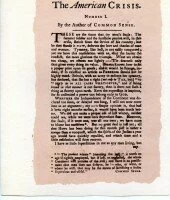
THESE are the times that try men’s souls. The summer soldier and the sunshine patriot will, in this crisis, shrink from the service of their country; but he that stands by it now, deserves the love and thanks of man and woman. Tyranny, like hell, is not easily conquered; yet we have this consolation with us, that the harder the conflict, the more glorious the triumph. Thomas Pain: December 1716.
Thomas Pain wrote those words at a time when Americans were facing what was at the time the most powerful nation on Earth. Today we are once again facing the most powerful nation on Earth, one that has the potential to become the most tyrannical regime to ever exist. This time it is the government of United States of America. Today we face our own government.
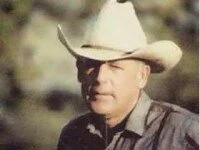
Cliven Bundy – Rancher
April 2014, A Rancher Stands In Nevada – A Renewed Reflection Of American’s Rejecting Lawlessness.
The Internet has been on fire over the past few days reporting and discussing the issue regarding a Nevada family and their fight to retain property they have managed and claim State ownership for over 100 years. All the details are unclear but what is clear is the US Government has been encroaching on ranchers, driving them out of livelihood for several decades, and capturing land, using fictitious environmental rationale in the area a few miles northeast of Las Vegas Nevada.

BLM Before the retreat
The standoff by federal Bureau of Land Management agents at the Bundy Ranch developed as a threat over the last week or so. Facing hundreds of heavily armed Federal agents the last surviving rancher in the territory refused to back down. The conflict escalated to the point of arrests, agents tazering citizens, road blocks, First Amendment free speech zones, snipers located in the hills, rounding up Bundy cattle as well as other livestock, and generally creating a siege around the Bundy property vicinity Bunkerville, Nevada.
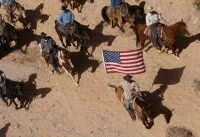
How the West Was Won 2014
The escalation of tensions continued until Saturday April 12, 2014. Late in the day, the most dramatic, turn-around of the potential life threatening event came to an end…the Feds backed down! Sighting concerns over the safety of their own men, but never once voicing concerns for the lives or safety of the rancher or his family.
Does it represent a tsunami that may be overtaking America…?
 What was the critical factor that brought the power of the federal government lawlessness to a halt; a retreat, perhaps temporary, in Bunkerville, Nevada? The answer is a power higher than man, the love of freedom, liberty, the power of some thousands of peaceful American citizens rejecting Gestapo type activity. Putting personal considerations aside, probably exercising sacrifice, Americans descended on the area surrounding the Bundy Ranch from all over America to display, in no uncertain terms, “we will no longer stand by and allow lawless, anti-Constitutional behavior by oath sworn forces.”
What was the critical factor that brought the power of the federal government lawlessness to a halt; a retreat, perhaps temporary, in Bunkerville, Nevada? The answer is a power higher than man, the love of freedom, liberty, the power of some thousands of peaceful American citizens rejecting Gestapo type activity. Putting personal considerations aside, probably exercising sacrifice, Americans descended on the area surrounding the Bundy Ranch from all over America to display, in no uncertain terms, “we will no longer stand by and allow lawless, anti-Constitutional behavior by oath sworn forces.”
 American’s who have had enough of the heavy hand of tyrannical government arrived…men, women, ordinary citizens, standing in aid of the immediate oppressed and for generations of future children and grandchildren in America.
American’s who have had enough of the heavy hand of tyrannical government arrived…men, women, ordinary citizens, standing in aid of the immediate oppressed and for generations of future children and grandchildren in America.
The Bunkerville event should be a signal for all America and the planned Operation American Spring event in several ways. One; The effectiveness of a large, determined, peaceful assembly of “We the People” does have an effect on and the people can take back control of the out-of-control federal government if we are willing to stand up. Two, a heartfelt reflection of how deep seated our desire has become to pursue freedom, liberty, even at the expense of potential harm to our persons.
Rest assured that the battle over this ranchers land is far from over, the federal government intends to complete the takeover of the land, and one way or another this rancher will be removed just as all the others before him.
Operation America Spring reflects a much larger challenge but the potential impact is similar to the results carried out by God fearing, constitutional loving, determined patriots in Nevada. Our brave “We the People” in Nevada have refreshed true hope of freedom, liberty, and a reversal of tyrannical behavior in government.
On May 16tth, 2014 Operation American Spring will present another opportunity to stand down tyrants in Washington, D.C. We The People can stop the tyranny stemming from this out of control government, but only if they are willing to stand and defend their own freedoms and liberty.
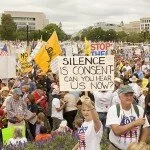 May all be so bold to mirror our Nevada brethren’s courage for freedom in Washington, D.C. May 16th, 2014.
May all be so bold to mirror our Nevada brethren’s courage for freedom in Washington, D.C. May 16th, 2014.
Harry Riley, COL, USA, Ret
Operation American Spring Coordinator.
Americans put forth their vision of respect for self government and individual sovereignty with the unanimous Declaration of 1776. The Declaration of Independence on July 4th 1776 declares the necessity of mutual respect for the natural and God given rights of men. It enumerates the rights of individual life, liberty, property, sovereignty, stewardship for happiness and progression either directly or by implication. As such, the unanimous Declaration establishes the supremacy of self government with respect for rights over rule by man made laws. The rule of law in this republic is governed by the higher principles of the unanimous Declaration which is the founding document for the American experiment in self government. Any interpretation of the Constitution as the law of the land must be subjected to the light and clarity of the Declaration of Independence to establish its validity. All legislation, executive declaration or court opinion must withstand the same scrutiny. Obviously the purpose of the Constitution was to delegate certain powers of the people and the states to maintain order, mediate conflicts of interest and provide for a united defense in the face of invasion. The hope is that we may have peace, tranquility and progress as a nation united in the vision and power of the Declaration of Independence and self government with mutual respect for natural and God given rights. In this light, nothing in the Constitution can be construed in good conscience, as a license to violate the natural and God given rights of men for the good of the state.–Gunny Barton, Ret.




Recent Comments